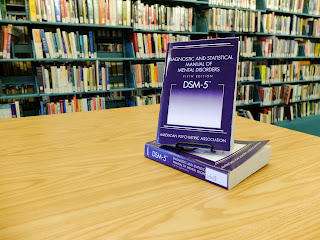In this post I will be analyzing the different groups in my controversy and how they interact with one another through assigned questions. My controversy surrounds the recent revision of the Diagnostic and Statistical Manual of Mental Disorders, or DSM-5. In this most recent revision, the bereavement exclusion criteria for Major Depressive Disorder has been removed. Meaning, grief from the loss of a loved one may now count towards having Depression.
 |
| CCAC North Library, "DSM-5," September 8, 2014 via flickr, Attribution-NonCommercial 2.0 Generic |
- Who is involved in the controversy?
- Physicians and Psychologists who use the DSM in their work
- Who are some of the major speakers/writers within these groups?
- The editors of the DSM are an important group of people in defense of the DSM.
- What kind of social/cultural/economic/political power does each group hold?
- The editors of the DSM hold power over the diagnostic criteria for most mental disorders, giving them immense power in the clinic realm. Those against the newest revision of the DSM are a diverse group of people that don't collectively hold any power other than the power to voice their opinions and concerns.
- What resources are available to different positions?
- The editors of the DSM can control what content is published in the new DSM. The opponents of the revised DSM have the resources to publish their concerns or opposition to the revisions.
- What does each group value?
- The opponents of the DSM value a more individualized approach to diagnosing mental disorders, while the editors of the DSM consider the DSM extremely useful to standardize medical diagnoses.
- What counts as evidence for the different positions?
- Both positions use scientific research to support their claims because this is an academic debate.
- Is there a power differential between the groups?
- Yes. The editors of the DSM have considerably more power than their opponents because they have control over what is published in each edition of the DSM.
- Is there any acknowledged common ground between groups?
- Some psychologists in opposition believe that the entire idea of a DSM isn't a good idea for diagnosing something as different between people as mental disorders. But, some psychologists believe that the DSM is a good starting point for diagnoses, but are opposed to individual sections or revisions of the DSM. So, the latter group and the editors of the DSM have an agreed common ground that the idea of having a DSM is beneficial to psychiatry.
- Is there any unacknowledged common ground?
- No. Because this is an academic debate, all issues are addressed in order to try to better the field of psychiatry.
- Do the various groups listen to each other? That is, do they respond directly to the claims made by each other? Or do they only talk to people who already hold the same position?
- Yes, the various groups do listen to each other. The editors of the DSM often take into account the concerns of psychologists who are against certain revisions or suggestions. Also, many editors of the DSM have written articles in defense of the recent revisions made by answering questions regarding their choices of what to include. For example, one of my general sources is an article written by one of the editors of the DSM explaining their choice to delete the bereavement exclusion for a diagnosis of Major Depressive Disorder.

No comments:
Post a Comment